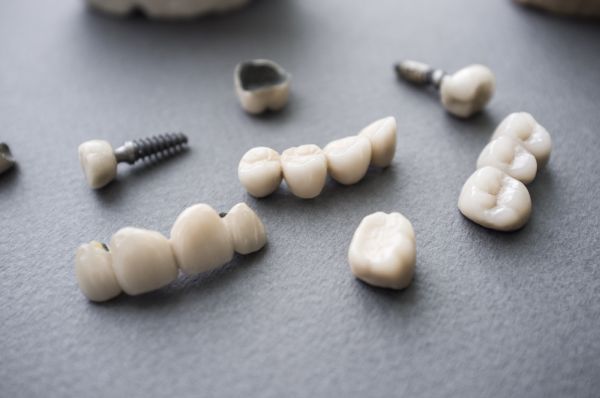Is a Dental Crown the Same Thing as a Cap?

If you have ever had an issue with your teeth, you may have heard of the helpful dental crown. Crowns are popular dental devices that have been used in modern dentistry for decades. Dental crowns are used to restore a tooth both in functionality and appearance.
What are dental crowns?
What many dental patients may not realize is that the term “cap” is often used to describe a dental crown. A cap and a crown is the same thing — "cap" is just a descriptive term for the device. Dental crowns are prosthetic teeth caps that are permanently placed over a prepared tooth. Severely damaged, infected or decayed teeth can benefit from a crown.
The procedure
First, the dentist will clean the teeth. Preparing the tooth is a process where the dentist uses a dental drill and other tools to remove some of the tooth structure to make room for the crown. The tooth is shaped into a peg-like abutment. After the tooth is prepared, an impression is taken of the mouth. This molding is then sent to the dental laboratory to create a custom crown.
When the crown is ready, there is a second appointment for its placement. The dentist will first test the crown to make sure it was molded properly. Finally, the tooth-shaped, tooth-colored cap is then permanently cemented onto the prepared tooth. The cap completely encompasses the tooth above the gumline and effectively restores the functionality and appearance of the tooth.
What are dental crowns made of?
Crowns can be made from a variety of materials. The most popular type of crown is the all-porcelain crown due to its natural appearance and durability. Metal alloy crowns and porcelain-fused-to-metal crowns are not as popular, as they do not blend in as well with the rest of the teeth. Furthermore, porcelain-fused-to-metal crowns tend to have a dark ring around the gumline, especially when gum recession occurs.
What are crowns used for?
Often, dental crowns are used to restore severely broken, cracked, weakened, decayed or discolored teeth. Teeth that have received recent root canal treatment usually need to be supported by a dental crown, as the procedure causes teeth to be hollowed and therefore, weakened. Deeply discolored teeth with either deep staining or a grey appearance are good candidates for dental crowns as well.
Crowns are meant to effectively cap the tooth and protect it from further damage while preventing tooth decay. These caps are meant to last a decade or longer. With proper care, crowns can last a lifetime.
Caring for your dental crown
For the most part, a crown can be treated like a natural tooth. Brush and floss the crown daily to keep it clean. Although the crown is resistant to tooth decay since it is made from fabricated materials, the gums and surrounding teeth are still vulnerable to bacterial attack. To ensure the longevity of a dental crown, optimal hygiene is vital.
Like natural teeth, crowns can still be damaged. Avoid habits like chewing on ice or pencils, and try to control conditions like bruxism (teeth grinding) in order to protect a crown.
Dental crowns to cap your teeth
Dental crowns are used to fix a variety of dental issues. Whether you have concerns with the way your teeth look, feel or work, dental crowns can usually help.
Request an appointment here: https://metrosmiles.com or call Metro Smiles Dental at (718) 841-9591 for an appointment in our Forest Hills office.
Check out what others are saying about our services on Yelp: Read our Yelp reviews.
Related Posts
Whether you are missing a tooth or have a cracked tooth that needs repair, restorative dentistry can help. This article will discuss some of the most common dental restoration services available today.A tooth-colored filling, also known as composite resin, is made of plastic and can be used to replace decayed areas of teeth. The material…
Clear braces and other orthodontic advances make teeth straightening treatment more attractive to many patients. From clear aligners to ceramic braces, these innovative treatments allow patients to align their smiles without noticeable metal brackets and wires. Thanks to these alternatives, teeth straightening has become more accessible to those who want to avoid traditional metal braces.Traditional…
Cracked and chipped teeth can be unsightly and painful, but dental restoration can help. Even a painless chip or crack may become a bigger problem if left untreated. Severe pain, swollen and tender gums, and infection may result. In the worst cases, it will be necessary to extract the broken tooth. There are many ways…
You may need a type of dental restoration at some point in your life. There are many types of treatments available. Knowing how to select each one can give you the results that you need. Here are some tips on how to choose the right type of dental restoration procedure that will fit your dental…
